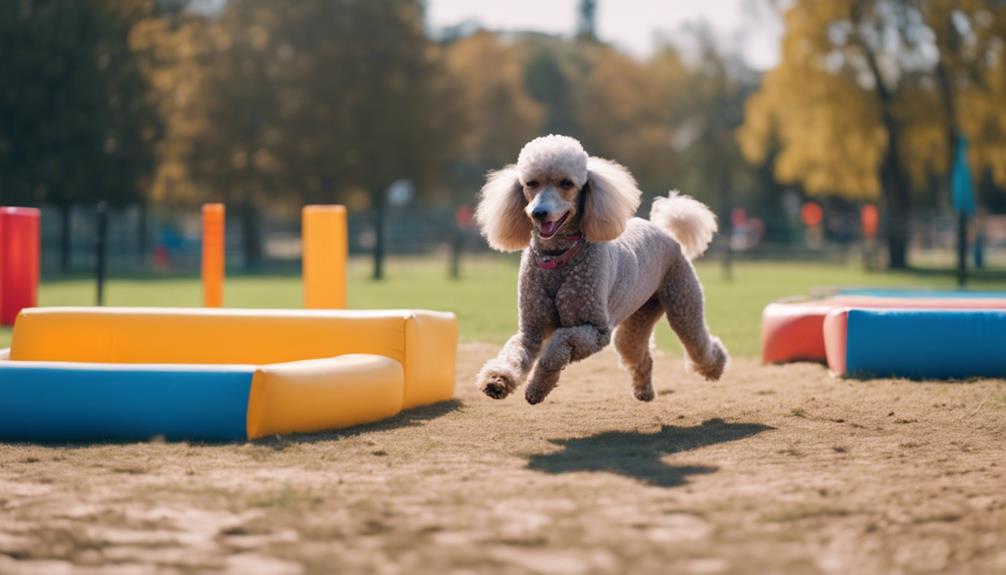Imagine your Poodle as a high-powered sports car revving its engine, waiting to hit the open road. Just like a well-tuned vehicle, your Poodle needs the right maintenance to channel that energy effectively. But how can you fine-tune their hyperactivity without hitting a roadblock? Let's explore some practical strategies to help your Poodle find their perfect balance of exercise and training.
Key Takeaways
- Regular exercise and mental stimulation are vital to manage poodle hyperactivity effectively.
- Tailoring physical activities to poodle size and age is essential for balanced energy levels.
- Consistent training routines help prevent behavioral issues and maintain a well-behaved companion.
- Structured activities like agility courses and interactive games provide necessary physical and mental stimulation.
Understanding Poodle Hyperactivity
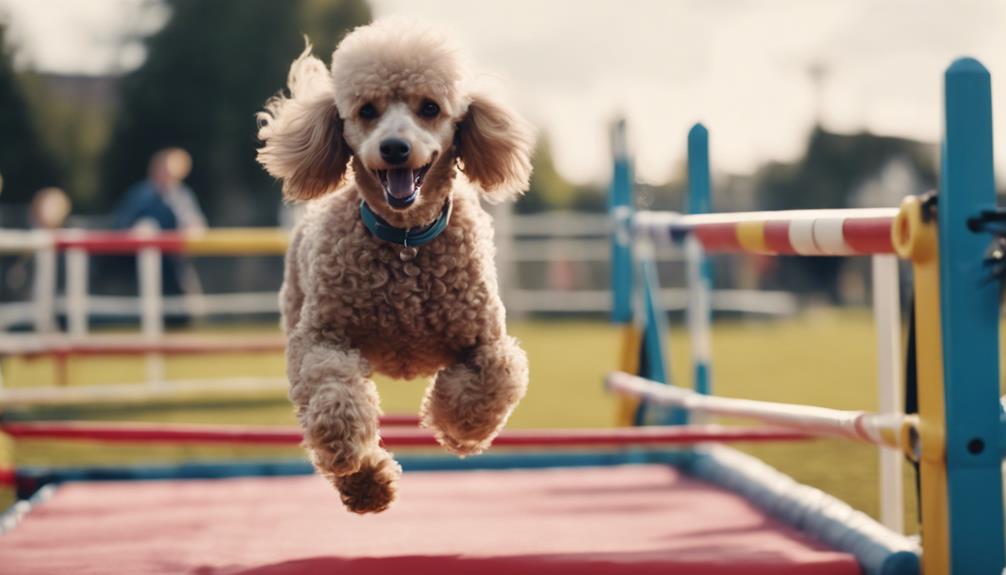
Understanding Poodle Hyperactivity starts with recognizing the various factors that can contribute to this behavior in your furry companion. Your dog's genetic makeup, environmental influences, and breed characteristics all play a role in determining its energy levels. Poodles, known for their intelligence and agility, require adequate exercise and mental stimulation to prevent hyperactivity. Without proper training and activities to channel their energy, poodles may exhibit signs of hyper behavior. It is crucial to understand that historical traits of high energy levels in poodles emphasize the need for addressing hyperactivity through appropriate measures. By recognizing health considerations that can impact your dog's energy levels, you can effectively manage and reduce hyperactive tendencies. Stay attentive to your poodle's exercise needs and provide consistent training to help them lead a balanced and fulfilled life.
Importance of Exercise for Poodles
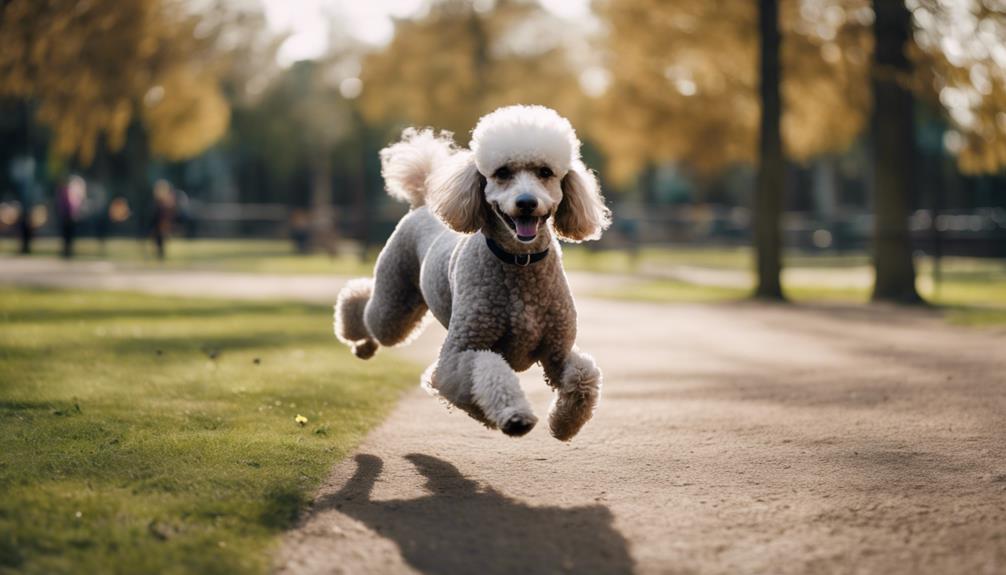
Regular exercise is crucial for managing your poodle's hyperactivity as it helps release pent-up energy. Ensuring your poodle receives both physical and mental stimulation is key to promoting balanced behavior. Daily walks and engaging play sessions are effective ways to prevent behavioral issues and keep your poodle healthy and content.
Exercise Benefits Poodles
To ensure the optimal health and well-being of your poodle, incorporating consistent exercise into their routine is paramount. Poodles have specific exercise needs that, when met, help prevent behavioral issues such as hyperactivity and contribute to their physical health. Daily physical activity plays a crucial role in managing the high energy levels commonly found in poodles, promoting overall fitness and vitality. Engaging in tailored exercise routines not only keeps your poodle physically fit but also aids in maintaining a well-balanced and contented demeanor. Check out the table below to understand the various benefits that exercise brings to your poodle's life:
| Exercise Benefits for Poodles |
|---|
| Prevents behavioral issues like hyperactivity |
| Maintains physical health |
| Promotes overall fitness and vitality |
Physical Activity for Poodles
Incorporating consistent physical activity into your poodle's routine is essential for maintaining their optimal physical and mental well-being. Regular exercise plays a crucial role in preventing boredom, anxiety, and destructive behaviors in poodles. It contributes to a balanced energy level and overall health, ensuring a happy and healthy pet. Engaging in play and exercise routines provides the mental stimulation that poodles need to thrive. Tailoring exercise regimens to your poodle's size and age is vital for their well-being. By incorporating proper physical activity and training into your poodle's daily schedule, you are investing in their long-term health and happiness. Remember, a well-exercised poodle is a content poodle.
Interactive Games for Poodles
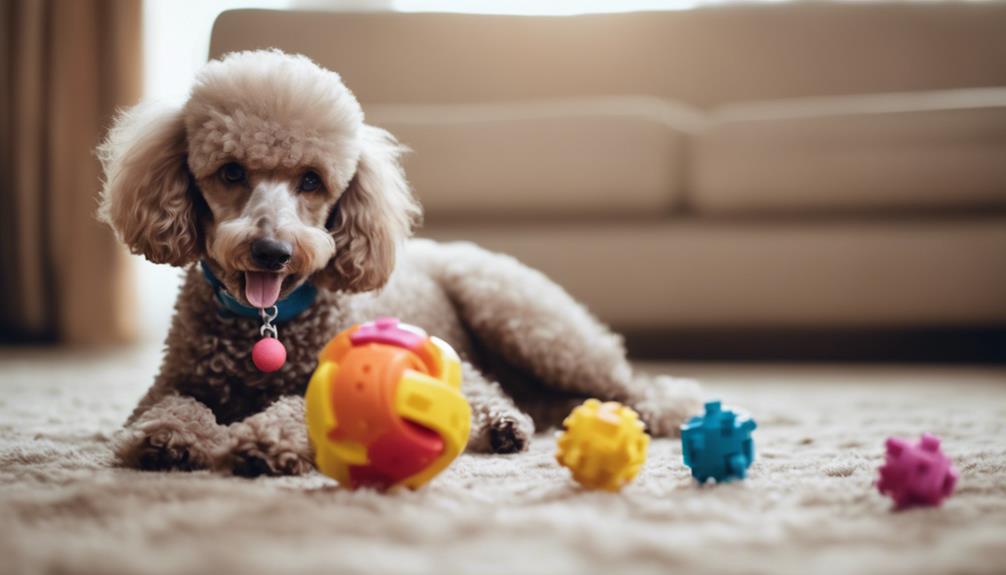
Engage your poodle's mind and keep them entertained with interactive games like hide and seek, puzzle toys, and scent games. Provide physical exercise and mental stimulation through activities such as agility courses, fetch, and tug-of-war. Reinforce good behavior and focus by incorporating obedience training games like 'find it' or 'stay,' ensuring a well-rounded playtime experience for your hyperactive poodle.
Mental Stimulation Through Play
Interactive games such as hide-and-seek, puzzle toys, and scent games are effective ways to provide mental stimulation for hyperactive poodles. To keep your poodle mentally engaged and entertained, consider the following:
- Agility Training: Engage in activities like agility training to challenge your poodle both mentally and physically.
- Rotating Toys: Regularly switch out toys and games to prevent boredom and keep your poodle sharp and focused.
- Obedience Training: Incorporate obedience training into play sessions to reinforce good behavior and mental engagement.
- Problem-Solving Toys: Use interactive feeding puzzles and treat-dispensing balls to offer mental stimulation and entertainment for your hyperactive poodle.
These interactive games and activities can help fulfill your poodle's need for mental stimulation and provide a fun way to bond with your furry friend.
Bonding With Your Poodle
To strengthen the bond with your hyperactive poodle, consider engaging in stimulating games that promote mental and physical activity. Interactive games such as hide-and-seek and puzzle toys can be excellent for bonding with your poodle. Playing fetch or tug-of-war not only provides mental stimulation but also offers physical exercise. Teaching your poodle new tricks through interactive games can be a fun way to enhance your relationship. Additionally, agility training or setting up obstacle courses specifically designed for poodles can challenge them both mentally and physically, further deepening your bond. Scent games or treasure hunts are also great options as they tap into your poodle's natural instincts and provide mental enrichment. Bond with your poodle through these interactive games to create a strong and lasting connection.
Energy Outlet Options
Consider incorporating stimulating interactive games to provide your hyperactive poodle with effective energy outlets. Interactive games like hide and seek, puzzle toys, and scent games can offer mental stimulation for hyperactive dogs. Agility courses and obstacle challenges provide physical exercise and mental engagement during training sessions. Teaching new tricks and commands through training games helps channel excess energy in a positive way, benefiting both you and your poodle. Engage in interactive fetch games with varying distances and obstacles to keep your poodle physically active. By rotating different interactive games regularly, you can prevent boredom and maintain interest in your hyperactive poodle, promoting a healthy outlet for their high energy behavior.
Positive Reinforcement Training Techniques
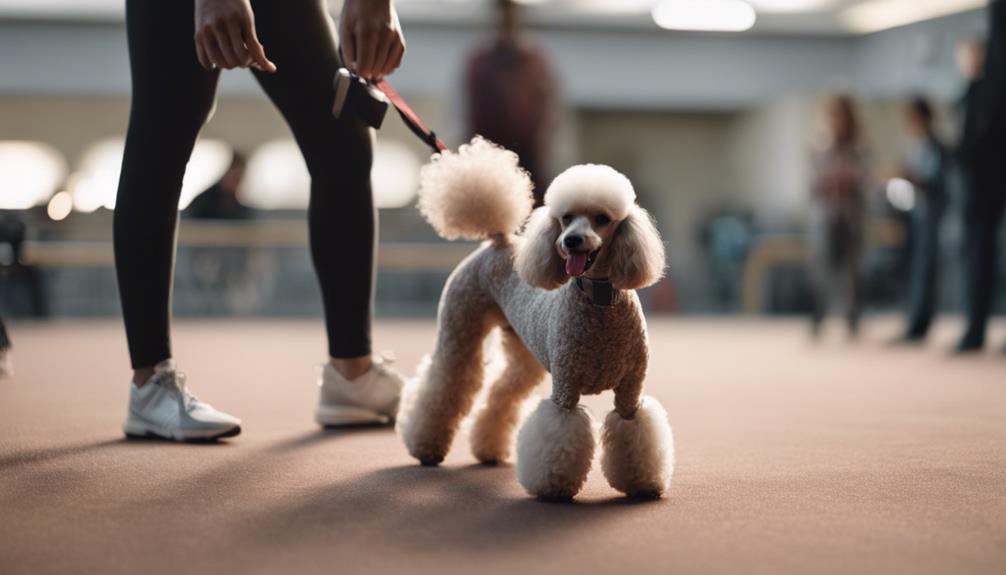
Implementing positive reinforcement training techniques is crucial for effectively managing the hyperactivity in poodles. Positive reinforcement training focuses on rewarding desired behaviors to encourage their repetition. Using treats, praise, toys, or affection as rewards can help reinforce positive behaviors in poodle puppies, creating a strong bond between you and your pet. This technique is particularly effective in shaping the behavior of hyperactive poodles by emphasizing good conduct. Consistency and patience are key when implementing positive reinforcement techniques for training hyperactive poodles. Consider enrolling in training classes to learn the best practices for utilizing positive reinforcement effectively.
| Benefits of Positive Reinforcement Training | Examples of Rewards |
|---|---|
| – Encourages good behavior | – Treats |
| – Strengthens the bond between you and your poodle | – Praise |
| – Effectively shapes hyper dog behavior | – Toys |
Targeted Training Exercises
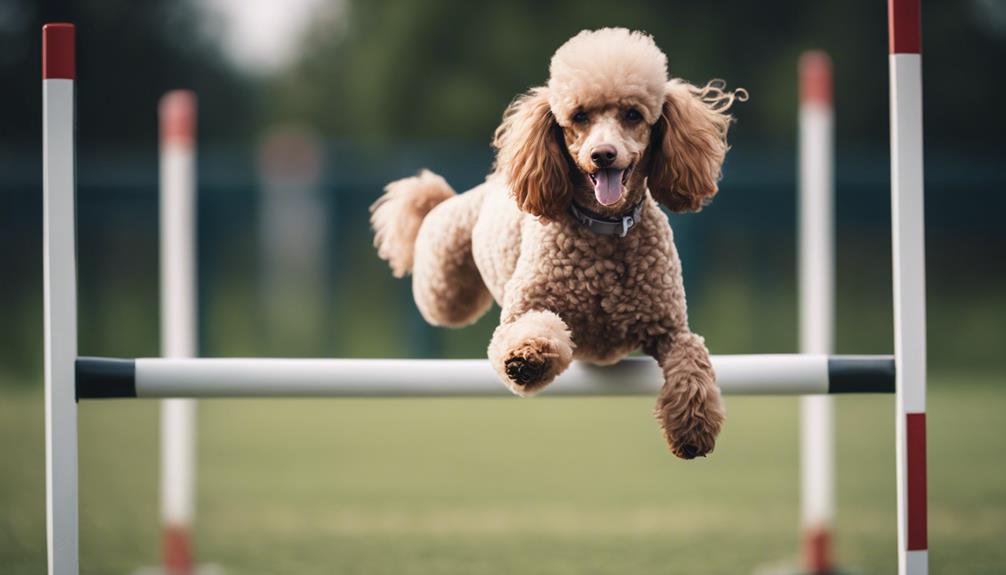
Targeted training exercises such as agility courses and obedience training tailored to your poodle's energy levels can effectively provide mental and physical stimulation to manage their hyperactivity. To help you address your poodle's hyperactivity through structured activities and behavior modification, consider the following:
- Agility Courses: Engage your poodle in agility courses to challenge their physical abilities and mental agility, providing an outlet for their energy in a constructive manner.
- Obedience Training: Incorporate specific commands during obedience training that match your poodle's energy levels, encouraging focus and discipline while addressing hyperactivity.
- Interactive Toys: Use interactive toys and problem-solving games to keep your poodle mentally stimulated during training sessions, promoting learning and behavior modification.
- Consistent Routine: Implement a consistent training routine with short, focused sessions to improve behavior and reduce hyperactivity, creating a sense of structure and stability for your poodle. By engaging in these structured activities, you can effectively manage your poodle's hyperactivity while fostering a calm and well-behaved companion.
Establishing a Routine

Establishing a routine for your hyperactive poodle is crucial for maintaining structure and stability in their daily life. Consistent feeding times, exercise schedules, and training sessions are key components that contribute to a well-rounded routine. By implementing a set routine, you provide your poodle with the predictability and guidance they need to thrive.
Daily Activity Schedule
To effectively manage your poodle's hyperactivity, it is crucial to set up a consistent daily routine that encompasses scheduled exercise, playtime, training sessions, and rest periods. Here are some key tips to help you establish a productive daily activity schedule for your furry friend:
- Structured Exercise: Plan outdoor walks, runs, or play sessions to help your poodle release excess energy.
- Playtime: Incorporate interactive games and toys to keep your poodle mentally stimulated.
- Training Sessions: Include regular training sessions to work on commands and behaviors.
- Rest Periods: Ensure your poodle has adequate rest times between activities to prevent overstimulation.
Adjust the daily schedule based on your poodle's age and energy level for optimal management of hyperactivity.
Consistent Training Methods
Creating a consistent training routine for your poodle is essential for instilling discipline and structure to manage hyperactivity effectively. Proper training involves establishing a daily schedule that includes short, focused sessions to promote calm behavior and mental stimulation. Consistency is key in reinforcing positive behaviors through techniques like positive reinforcement and repetition. By incorporating training into your poodle's daily routine, you help them understand and adapt to expected behaviors, reducing impulsivity and hyperactive tendencies. Remember, regular training sessions not only teach your poodle to focus and follow commands but also strengthen the bond between you and your furry companion. Stay patient, stay consistent, and watch as your poodle grows into a well-behaved and happy family member.
Mental Stimulation Activities
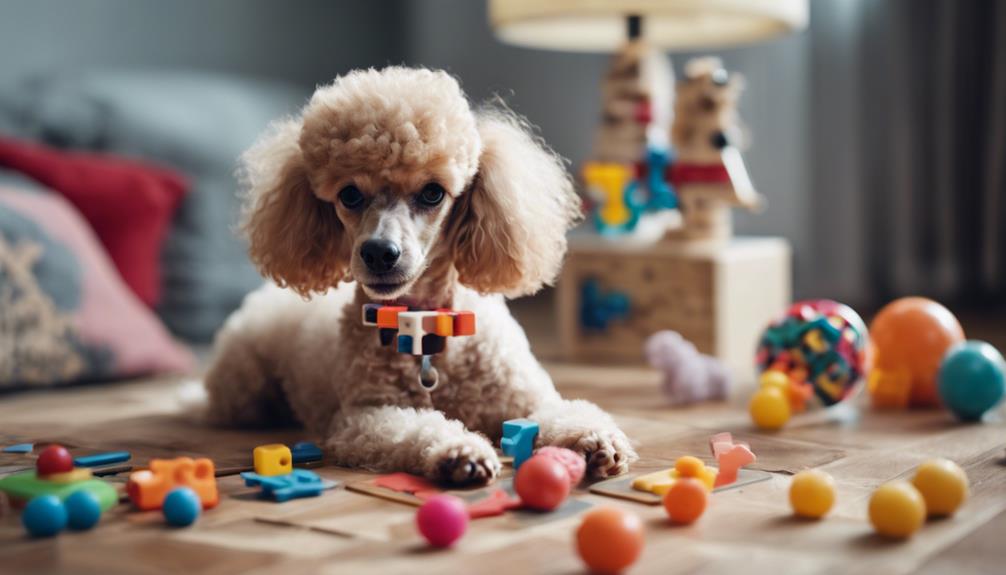
For managing poodle hyperactivity, incorporating mental stimulation activities is crucial to engage their problem-solving skills and channel their excess energy effectively. Here are some engaging activities to mentally stimulate your high-energy poodle:
- Puzzle Toys: Provide your poodle with interactive puzzle toys to encourage cognitive thinking and keep them entertained.
- Scent Games: Engage your poodle in scent games where they can use their keen sense of smell to find hidden treats or toys.
- Hide-and-Seek: Play hide-and-seek with your poodle to stimulate their mind and provide a fun mental challenge.
- Clicker Training: Use clicker training to teach your poodle new tricks and reinforce positive behaviors through mental stimulation.
Obedience Training Strategies
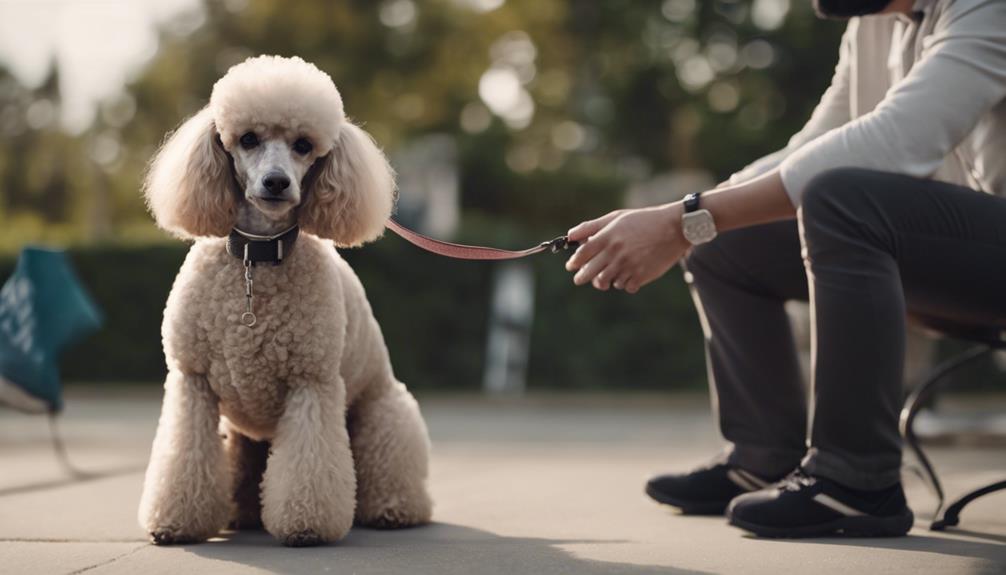
Establishing a consistent routine is key in implementing effective obedience training strategies for managing hyperactivity in your poodle. Obedience training plays a vital role in shaping your poodle's behavior and promoting a sense of calm. By engaging in regular training sessions, you can teach your poodle essential commands and reinforce self-control in various situations. Utilizing clear cues and maintaining eye contact during training sessions can help keep your poodle focused and prevent unwanted behaviors from arising. Consistency is key when it comes to obedience training as it reinforces the learning process and establishes your leadership.
Obedience Training Strategies Table
| Training Strategy | Description | Benefits |
|---|---|---|
| Positive Reinforcement | Rewarding good behavior with treats or praise | Encourages desired behaviors |
| Clicker Training | Using a clicker to mark correct behaviors | Enhances communication |
| Daily Exercise Routine | Incorporating physical activity into training | Helps release excess energy |
Behavior Modification Methods
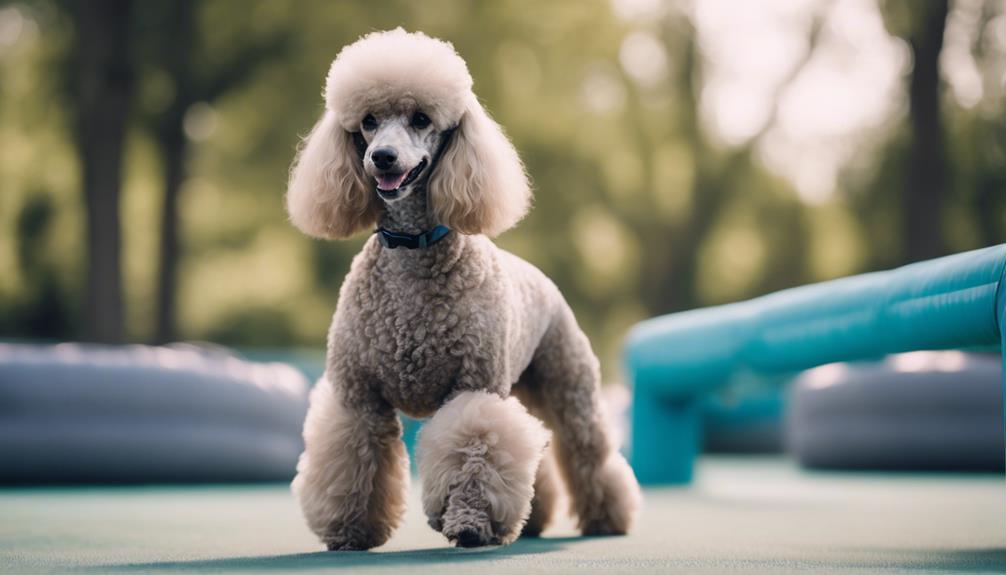
To effectively address hyperactivity in your poodle, implementing behavior modification methods is crucial for reshaping unwanted behaviors and fostering a calmer demeanor. When dealing with a hyperactive poodle, consider the following techniques recommended by a Professional Dog Trainer:
- Use Positive Reinforcement: Rewarding good behavior with treats or praise can encourage your poodle to repeat those actions, reinforcing positive habits.
- Daily Exercise: Engaging your poodle in physical activities like walks, runs, or interactive play sessions can help burn off excess energy and promote relaxation.
- Redirecting Energy: Channel your poodle's energy towards constructive outlets such as puzzle toys or obedience training to prevent destructive behaviors.
- Consistent Training: Establish clear boundaries and commands, and consistently enforce them to provide structure and reduce impulsivity in your poodle's actions.
For more personalized guidance on addressing extreme hyperactivity, consider seeking the assistance of a Professional Dog Trainer who can create tailored behavior modification plans to suit your poodle's specific needs.
Calming Techniques for Poodles
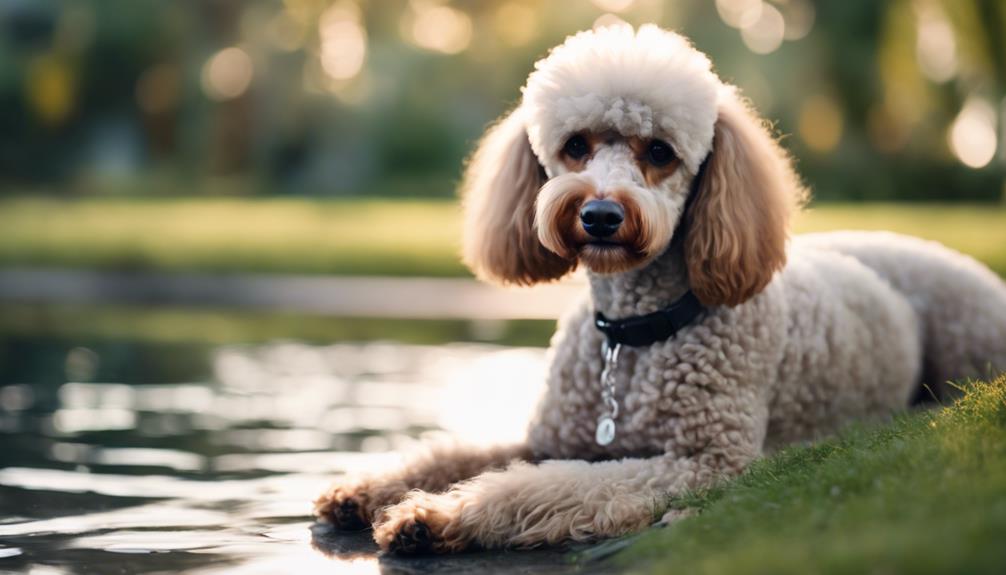
Implementing various calming techniques is essential for managing hyperactivity in poodles. As dog owners, you can help your poodle stay calm by providing both mental and physical stimulation. Interactive games and puzzles are great tools to focus their energy and reduce hyperactivity. Establishing a structured routine with consistent exercise can also play a significant role in managing your poodle's excess energy. Teaching relaxation cues like 'settle' or 'place' can assist in calming overactive poodles, giving them a clear signal to relax. Additionally, incorporating training sessions using positive reinforcement techniques can promote calm behavior in your poodle. Remember, a combination of mental stimulation, physical exercise, and consistent training can help your poodle stay calm and content. By implementing these techniques, you can create a harmonious environment for both you and your furry companion.
Creating a Stimulating Environment
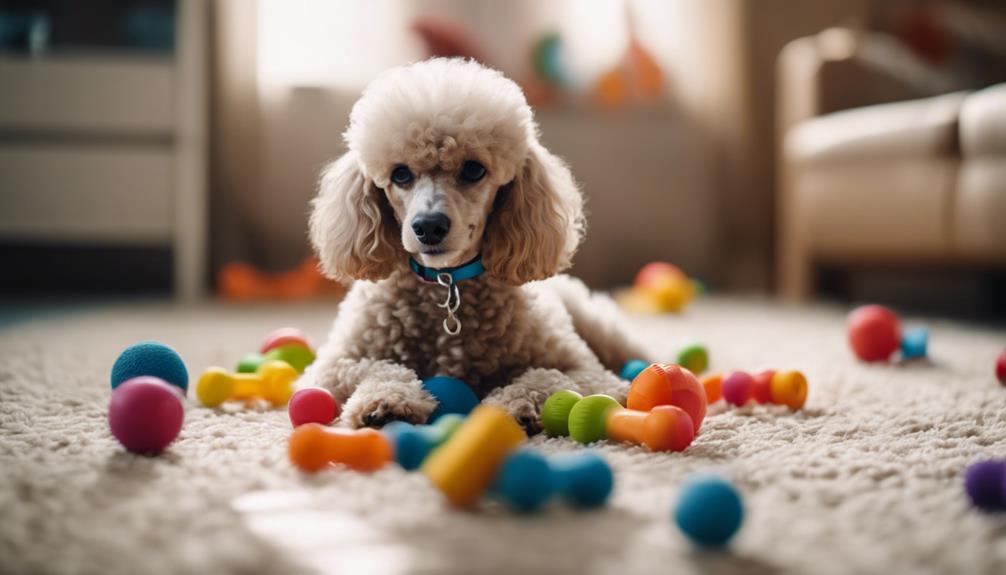
To create a stimulating environment for managing poodle hyperactivity, consider providing a safe play area and a quiet resting place for your poodle puppy. Here are some tips to help you create an environment that can keep your poodle engaged and mentally stimulated:
- Design a Varied Play Area: Include toys, tunnels, and interactive games to keep your poodle physically and mentally active.
- Balanced Indoor Exercise: When unable to go outside, engage your poodle in indoor exercises like hide-and-seek or teaching new tricks.
- Scheduled Social Time: Arrange playdates with other dogs in a safe environment like a dog park to provide social interaction and prevent a lack of exercise.
- Quiet Resting Space: Create a cozy spot where your poodle can relax and unwind after periods of activity, helping to maintain a healthy balance.
Seeking Professional Help
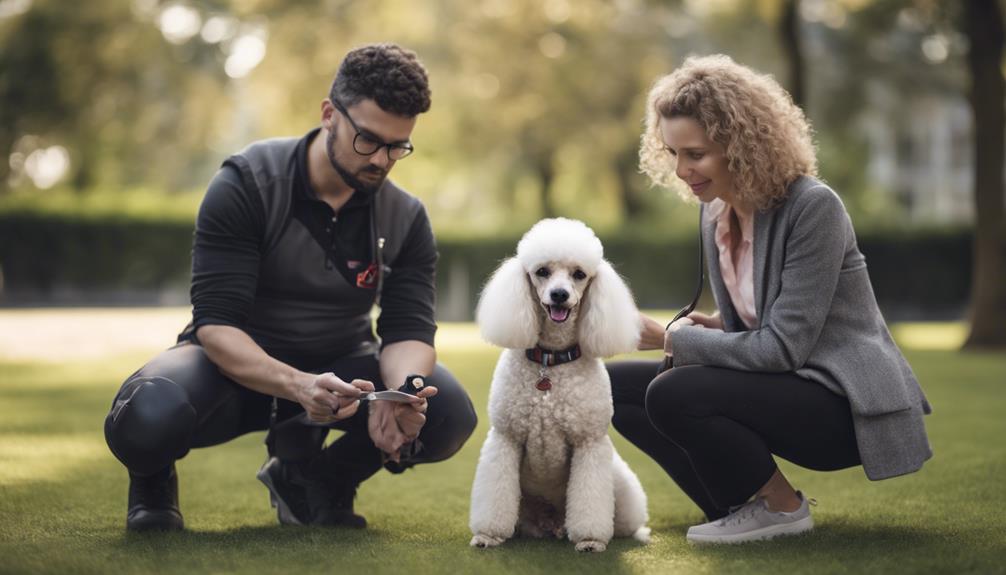
Seek out a certified behavior professional to address clinical hyperactivity in your poodle effectively. These professionals, such as certified behavior consultants or dog trainers, can provide tailored behavior modification plans to suit your poodle's specific needs. By seeking professional help, you can pinpoint underlying issues contributing to your poodle's hyperactivity and receive expert guidance on effective training techniques and management strategies. Behaviorists specializing in poodle hyperactivity can offer comprehensive assistance in managing and modifying your furry friend's behavior. Here is a table highlighting the benefits of seeking professional help:
| Benefits of Professional Help | |
|---|---|
| Tailored Behavior Modification Plans | Expert Guidance on Training Techniques |
| Identification of Underlying Issues | Specialized Management Strategies |
Consulting with a behavior professional ensures a holistic approach to managing your poodle's hyperactivity, leading to a happier and calmer companion.
Long-Term Management Strategies
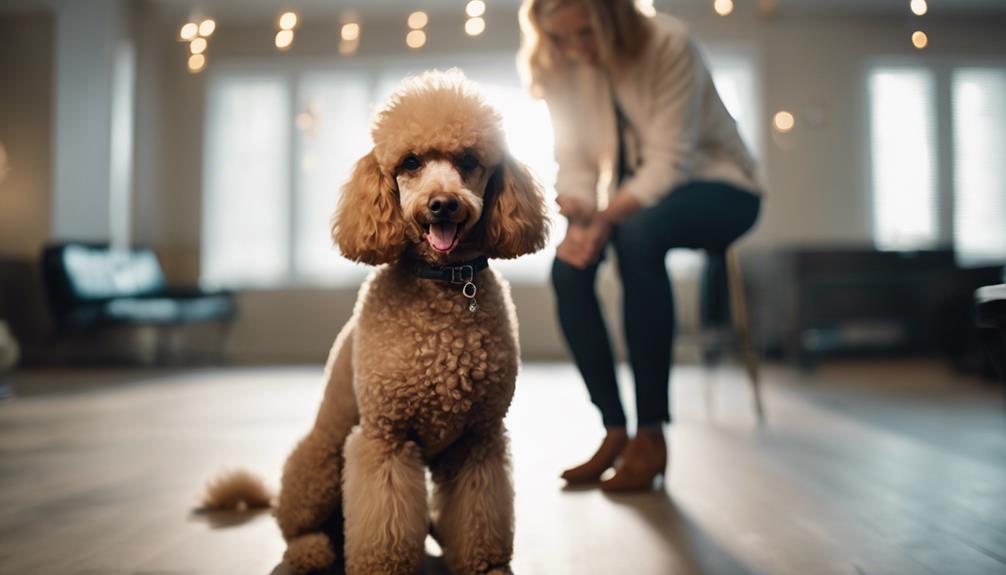
For effective long-term management of your poodle's hyperactivity, establish a consistent exercise routine tailored to its energy levels and age. Here are some key strategies to help you manage your poodle's hyperactivity effectively:
- Implement a Consistent Exercise Routine: Regular physical activity is crucial for burning off excess energy. Tailor the exercise to your poodle's age and energy levels, incorporating activities like brisk walks, runs, or interactive play sessions.
- Utilize Positive Reinforcement Training: Reward calm behavior and self-control to reinforce positive habits. Use treats, praise, and other rewards to encourage desired behavior in your poodle.
- Incorporate Mental Stimulation Activities: Engage your poodle's mind with puzzle toys, obedience training, or interactive games. Mental stimulation can help channel your poodle's energy in a constructive way.
- Seek Professional Guidance: If your poodle's hyperactivity persists despite your efforts, consult a professional trainer or behaviorist. They can provide tailored advice and strategies to address your poodle's specific needs effectively.
Frequently Asked Questions
How Do You Train a Hyper Poodle?
To train a hyper poodle effectively, utilize positive reinforcement techniques, provide mental stimulation, maintain a consistent routine, and consider obedience classes for specific challenges. These methods can help your poodle focus and learn self-control.
How Do I Calm My Dog Down During Training?
To calm your dog during training, try relaxation techniques like deep breathing or gentle massage. Use positive reinforcement with treats or praise. Incorporate mental stimulation and provide outlets for energy release. Stay consistent and create a calm environment for focused learning.
What Is the Best Exercise for Poodles?
To keep your poodle active and happy, engage in outdoor activities for physical exercise, use interactive toys for mental stimulation, and incorporate obedience training for focus. Balancing these activities will help manage hyperactivity effectively.
Why Is My Poodle Hyperactive?
To understand your hyperactive poodle, consider their behavior, need for mental stimulation, proper socialization, and adequate energy outlets. Connect with your vet for guidance on ruling out medical issues and obtaining necessary tests for rare clinical hyperactivity.
Conclusion
In conclusion, managing Poodle hyperactivity requires a combination of exercise and training techniques. Did you know that Poodles are ranked as the second most intelligent dog breed? By providing regular physical activities, mental stimulation, and consistent training, you can help your Poodle channel their energy in a positive way. Remember to create a stimulating environment, seek professional guidance when needed, and maintain a balance between exercise and rest for a happy and well-behaved Poodle.
